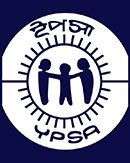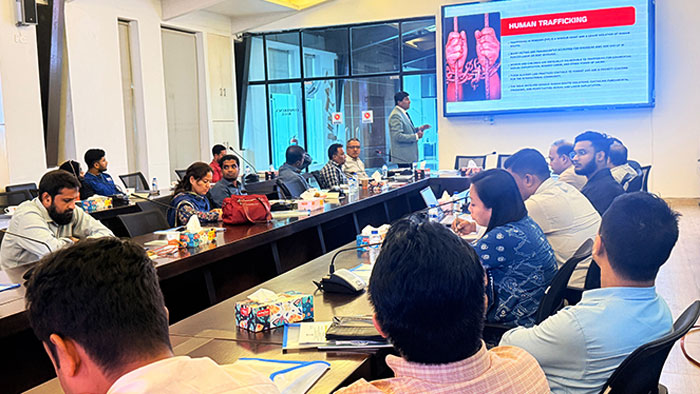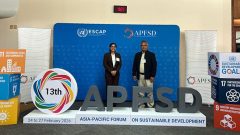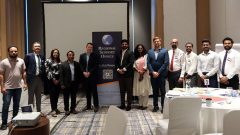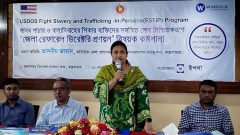For the first time of its kind, a Consultation Meeting on Counter Trafficking Issues was held in Cox’s Bazar, bringing together all Camp-in-Charges (CiCs) responsible for managing the Rohingya camps. The meeting served as a platform for CiCs to share real-life field experiences in combating human trafficking within the camps.
The meeting was organized by Young Power in Social Action (YPSA) on June 3, 2025, at the Conference Room of the Office of the Refugee Relief and Repatriation Commissioner (RRRC). The event was graced by Mr. Mohammed Mizanur Rahman, Additional Secretary and Refugee Relief and Repatriation Commissioner, who attended as the Chief Guest and inaugurated the consultation.
In his opening speech, Mr. Rahman stated, “Human trafficking is a criminal offense. We must fight against it. Justice must be ensured for trafficking victims under the country’s law. We must educate ourselves about the legal provisions concerning human trafficking. I thank YPSA for organizing this timely and important consultation on counter-trafficking issues.”
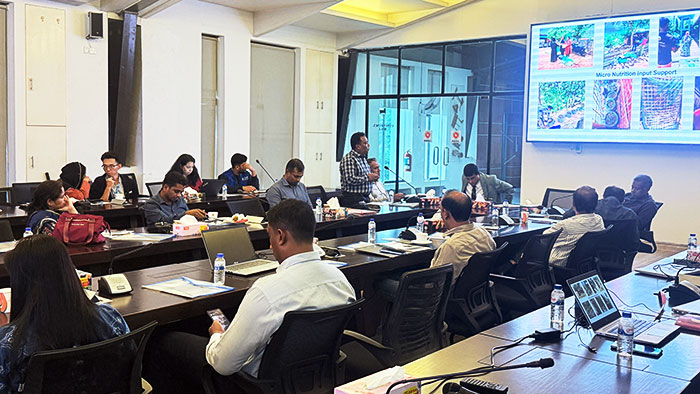
At the beginning of the meeting, Mr. Jishu Barua, Assistant Director and Counter Trafficking Focal at YPSA, outlined the objectives of the consultation and presented an overview of YPSA’s counter-trafficking initiatives, which have been ongoing in the Rohingya camps since June 2018.
He emphasized that the core goals of the meeting were:
- Enhancing collaboration in the prevention of human trafficking,
- Ensuring protection and justice for victims, and
- Mobilizing resources for reintegration support for the victims of trafficking.
This consultation is part of the project titled “Prevention and Response Activities Implementation on Counter Trafficking Issues”, implemented by YPSA in partnership with the International Organization for Migration (IOM) in both the Rohingya camps and host communities of Cox’s Bazar.
Participants included Camp-in-Charges (CiCs)—senior government officials at the rank of Secretary and Joint Secretary—tasked with the overall administration of camps for Forcibly Displaced Myanmar Nationals (FDMNs).

Mr. Mohammed Shahidul Islam, Deputy Director and Head of the Rohingya Response Program at YPSA, delivered a presentation on YPSA’s extensive interventions since the onset of the Rohingya influx in August 2017.
A team from the IOM Counter Trafficking and Protection Unit, led by Ms. Saadia Aleem, Protection Programme Coordinator, also participated. The IOM delegation included Ms. Sara Sadiya Israt, Field Coordinator, Counter Trafficking Unit.
Mr. Hideaki Kojima, Associate Protection Officer (Legal Protection) from UNHCR Sub-Office Cox’s Bazar and Co-Chair of the Anti-Trafficking Working Group (ATWG), also attended.
The Consultation Meeting was facilitated by Professor A.B.M. Abu Noman from the Department of Law, University of Chittagong.
Key Contents of the Consultation Meeting:
A. Discussion on the Prevention and Suppression of Human Trafficking Act, 2012
- Legal definitions, penalties, and victim protection mechanisms
- Confidentiality provisions with special safeguards for women and children
- Legal process of trafficking cases—from filing to conviction
- Challenges in prosecuting trafficking cases in Bangladesh and recommended actions
B. Understanding the Legal Rights of Trafficking Victims in the National Context
C. Legal Obligations for Supporting Rohingya Trafficking Victims
D. Interactive Session: Strategies to Bridge Gaps in Justice Delivery and Ensure Accountability
The event concluded with a commitment from all stakeholders to strengthen inter-agency collaboration, uphold the rights of trafficking victims, and ensure an effective, justice-driven response to human trafficking in the Rohingya response context.
